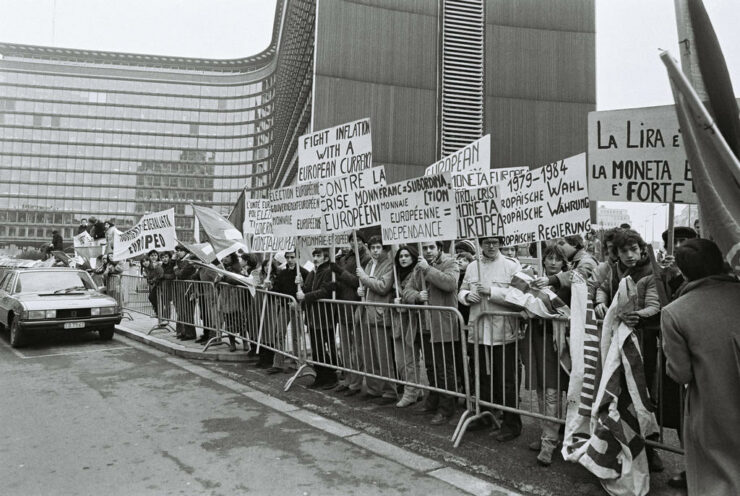Agenda
Conference ‘Towards A Social History of European Integration’
For the conference programme, click here
For the full call for papers, click here

Demonstration for a common European currency in front of Berlaymont building, 1978
© EU, via CVCE
Fishermen blocking the port of Calais, consumer groups lobbying the European Commission, fair-trade activists criticising European trade policies, and farmers and their tractors taking to the streets in Brussels: these are all examples of actors and stories that do not often make it into European integration textbooks, and yet they form an integral part of it. European Union (EU) policies have affected the lives of European citizens in multiple and profound ways; but, equally importantly, the actions of citizens and social forces have impacted on the EU institutions. Historians have only just begun to explore the ways in which this broader European social history also forms part of the history of European integration.
This conference aims to offer a bottom-up perspective by looking at the historical development of public contestation, mobilisation, and participation in the history of European integration. It will connect these topics to the question of institutional legitimacy, the legitimacy of the creation of the common market, and the evolving nature of the public sphere. In what ways have ‘ordinary Europeans’ and social groups sought to influence European policies and to what effect? But also how has the prominence of the European institutions changed the nature and focus of social protest? How has the creation of the common market and new policies by EU institutions shaped societies in the member states of the Community? How have the lives of ordinary Europeans changed as a result of European integration?
The conference will explore manifestations of support and contention from European citizens, social groups and their representatives, both within European institutions and outside, in newspapers and political forums, in town squares and even on seas. It will look at the interplay between social forces, and explore how far EU institutions were able to increase their power because social groups saw them as a means of advancing their interests and institutions took up their causes for their own purposes. It will also explore how these institutions became the locus of protest, thereby demonstrating the way in which they were seen as spaces to be occupied or bent to their purposes. Finally, it will address examples of domestic mobilisation of support or resistance towards policies that had a clear European dimension and which operated on the fault-lines between national and European politics, such as agriculture, fisheries, nuclear energy, trade, environmental and nature conservation policies.
This conference aims to lay the basis of a new social history of European integration. Our concern is to move beyond a narrative that portrays the EU as a transnational elite or technocratic domain, which only belatedly became politicised in the 1990s. Instead, we wish to embed the history of European integration in the social history of Europe in the second half of the twentieth century. Recent historical scholarship has shown how societal actors shaped the integration process and impacted on policy outcomes. Indeed, from its conception, the European Community offered opportunities for organised citizens to influence policy due to its multi-layered character, in an attempt to compensate for the institutions’ often-invoked ‘democratic deficit’. However, study of this phenomenon has too often been focused on the institutions themselves and contributed to a narrative of progressive Europeanisation. In contrast, we wish to throw open the doors, and study European integration as part of the rapidly changing social history of Europe.

